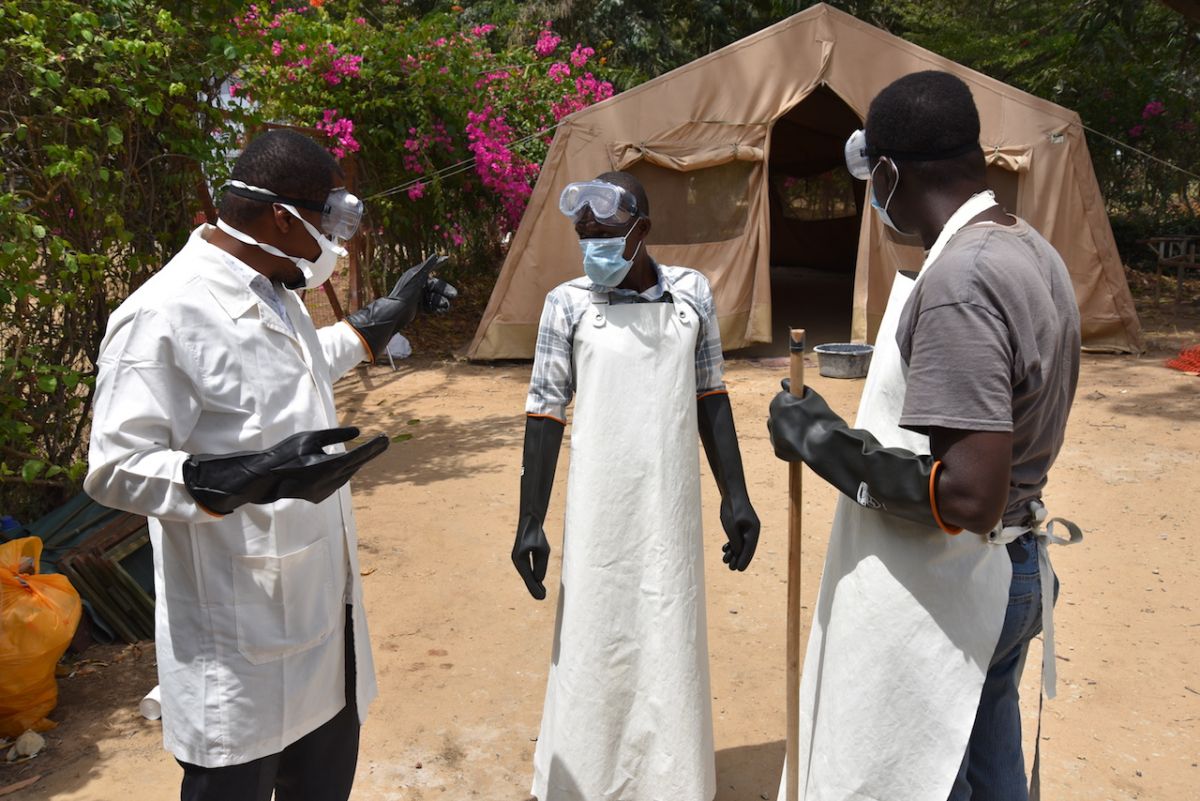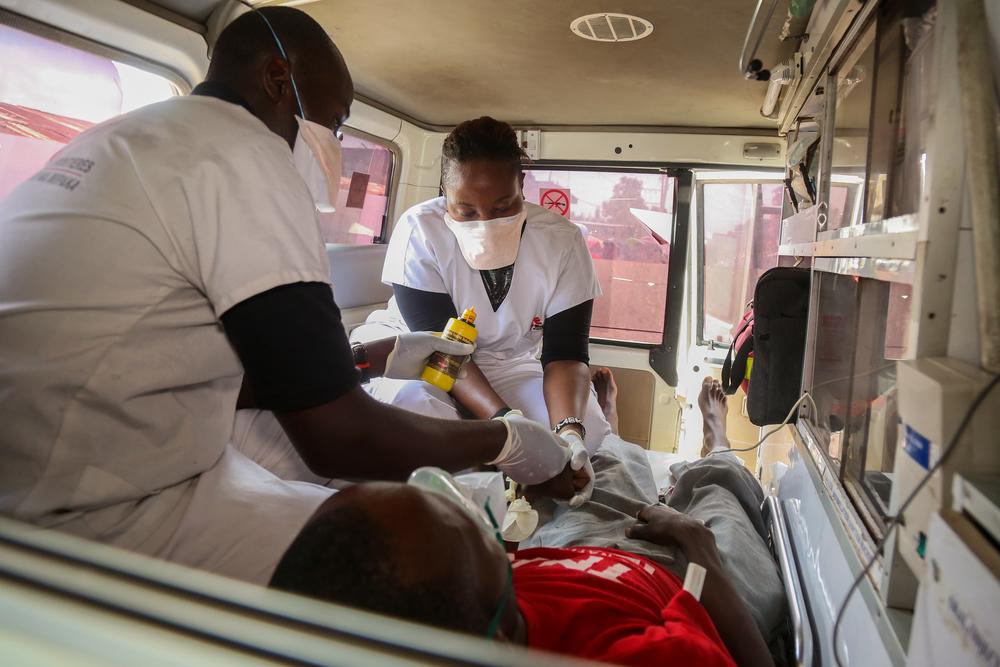Médecins Sans Frontières/Doctors without Borders (MSF) is working to adapt its medical programmes in Kenya to respond to the COVID-19 pandemic.
Teams are boosting infection prevention and control in medical facilities, setting up triage, screening centres, isolation rooms and training health workers, providing advice on isolation facilities and spreading health awareness messages.
In Kenya and around the world, MSF is particularly concerned about the impact of the pandemic on vulnerable groups. Those living in informal settlements or refugee camps are particularly at risk – these places tend to be overcrowded and people have little access to basic sanitation, including clean water.
“We are deeply concerned about the outbreak reaching overcrowded slum settlements such as Mathare and Kibera in Nairobi and refugee camps such as Dadaab,” says Lili-Marie Wangari, Emergency Preparedness Coordinator for MSF. “Right now, people need urgent access to water so they can wash their hands, as well as information about how to protect themselves and their families. Should the virus spread in these places, we would need urgent action to bring it under control.”
A team of seven MSF staff is supporting the Kibera South Health Centre in Kibera, Nairobi, where they are boosting infection prevention control, have set up screening and triage, as well as an area for suspect cases.
MSF teams are also due to put in place 60 water points across Mathare and Kibera in the coming days to help people to wash their hands. They will also boost the number of people out in the community spreading health awareness messages.
As well as being part of the National Taskforce on Covid-19, which meets twice a week to coordinate the discussion around the best ways for the country to prepare and respond to the outbreak, MSF is working with the health departments in the counties where it runs medical programmes - Embu, Kiambu, Mombasa, Garissa, Nairobi and Homa Bay. With such a comprehensive strategy needed to properly prepare for and respond to COVID-19, coordination between those working to tackle the pandemic is vital.
“One of our key priorities is to keep our existing medical programmes running for the patients and vulnerable communities we support; mothers will continue to give birth and people will still need emergency medical care during this outbreak,” said Dr. Mohammed Musoke, the Medical Coordinator for MSF in Kenya. “To keep people safe, we’re making adaptations to the way we care for our patients such as providing those with HIV and non-communicable diseases (NCDs) with up to three months’ supply of the medications they need, to minimise their exposure within health facilities.”
Protecting healthcare workers and patients remains essential to MSF and it is putting measures in place to ensure adequate infection prevention and control, setting up screening areas and triage systems, isolation areas and providing health education. In some of the facilities in which it works, MSF has set up isolation rooms, and is setting up a capacity to manage patients who turn positive for COVID-19 in Dagahaley camp.
“Even the most advanced health systems in the world have been overwhelmed by this outbreak, so we are deeply concerned about the potential impact in Kenya, and the scale of assistance that will be required” said Anne Cugier, MSF Head of Mission in Kenya.” Our ability to scale up in proportion to the outbreak will also be impacted by the challenges we face in staff and supplies, particularly in the personal protective equipment that is needed to keep health workers and patients safe, so our teams are trying to do what we can for the people who need our help the most.”
MSF Medical Programmes and COVID-19 response in Kenya

Kibera Health Centre:
MSF is supporting the Kibera South Health Centre in Kibera, which is a health facility built and previously run by the organisation. The team of seven staff is boosting infection prevention control, triage, screening and managing referral of suspect cases to a nearby hospital. They will soon set up water points in the community, and boost the number of people providing health awareness messages.
Treating NCDs in Embu:
Since 2017, MSF has been working in Embu to integrate management of non-communicable diseases (NCDs) into general healthcare facilities. More than 4,000 patients with NCDs have enrolled for treatment across eleven health facilities. In preparation for COVID-19, MSF has supported these 11 health facilities to boost infection prevention and control and to give health awareness messages to patients and staff. The organisation is also supporting the Embu County level five hospital with triage and screening of patients.
Treating Advanced HIV in Homa Bay:
In Homa Bay County Referral Hospital, MSF supports the adult medical wards with a capacity of 90 beds. MSF has continued to work on improving HIV care and reducing transmission and mortality rates in Homa Bay. In the face of COVID-19, MSF has provided three months of ARV treatments to patients to avoid their exposure at the hospital. The team have also set up triage, screening and an isolation room at the hospital to help to prepare for the outbreak.
In addition, MSF assisted the county health team to design the facility for managing confirmed cases of COVID-19 in Malela and provided logistic support and training to all the staff on case management and Infection Prevention and Control (IPC).
Care for people who use drugs in Kiambu:
MSF offers a one-stop-service centre for drug users, comprising opioid substitution therapy, treatment for HIV, TB, hepatitis C and non-communicable diseases (NCDs), wound care, mental health support and counselling, and sexual and reproductive healthcare in clinic in Kiambu. The Medically Assisted Therapy (MAT) clinic opened in September 2019 and today, more than 150 people who use drugs are enrolled in the program. MSF has set up triage system and an isolation room at the facility, and is also working at the nearby Karuri Hospital to boost infection prevention and control.
Care for victims of violence in Mathare:
MSF runs a trauma room in Mathare, Nairobi, to treat victims of urban violence in the city’s Eastlands area. The clinic is supported through a 24-hour, toll-free call centre and an ambulance programme that offers emergency care to patients and refers them for further treatment when necessary. An ambulance has been converted for use in referral of a COVID-19 patient.
MSF also runs a clinic providing specialised care for victims of sexual and gender-based violence in Eastlands in addition to supporting Ministry of Health facilities. Teams are providing mental health consultations by phone to continue to give people adequate care throughout the pandemic. They have been increasing health promotion efforts to ensure people know they are still available.
Medical care for refugees:
In Dagahaley camp, in Dadaab, Kenya’s largest refugee camp, MSF continues to support a 100-bed hospital and two health posts. MSF provides healthcare to refugees, many of whom have been in the camp for close to 30 years, and also local communities. The hospital provides comprehensive primary and secondary health care.
The teams are putting measures in place to ensure adequate infection control measures, setting up screening at triage, an isolation area and providing health education. Currently there is an isolation unit set up with 10 beds for patients thought to have COVID-19 and has a capacity to expand up to 40 beds if needed. The unit would be transformed into a treatment centre in the event of widespread community transmission or if other possibilities for patient care were not available. Training of health workers to create a pool of frontline responders is ongoing.
Comprehensive obstetric care in Likoni:
In Likoni subcounty, Mombasa, MSF supports the Department of Health to provide comprehensive emergency obstetric and neonatal care in the fully renovated Mrima health centre. Our teams there assist an average of 7,000 births every year, perform lifesaving obstetric surgery and support ante and postnatal care, as well as screening for cervical cancer, HIV and other sexually transmitted diseases. To prepare for COVID-19 they have set up isolation rooms which will allow women who have COVID-19 to give birth safely.
